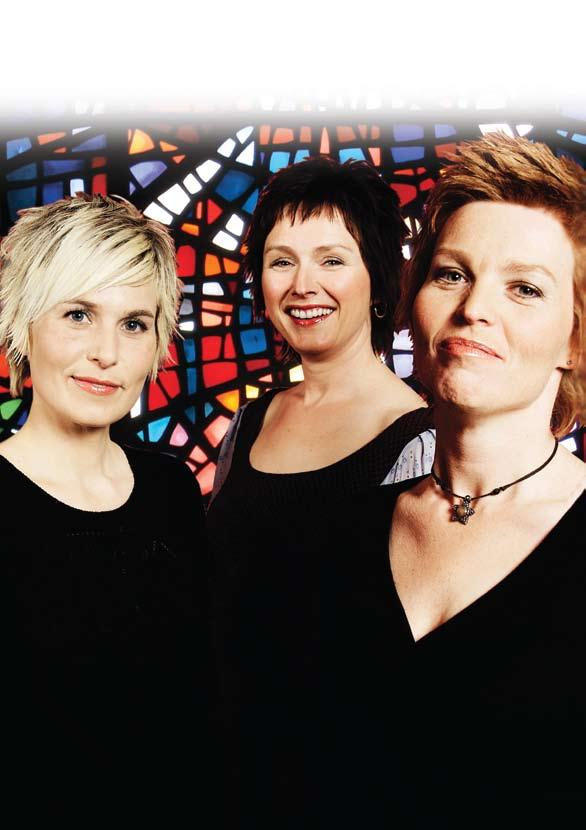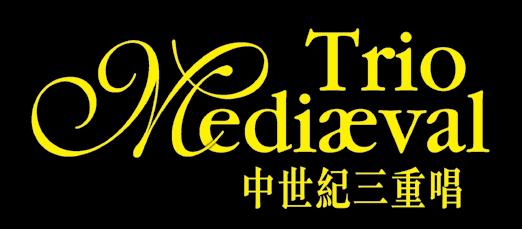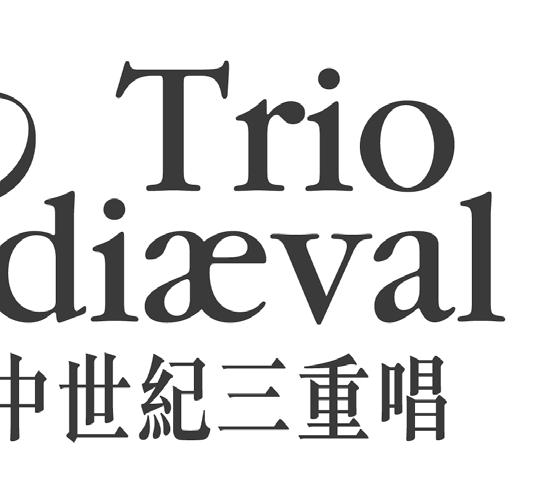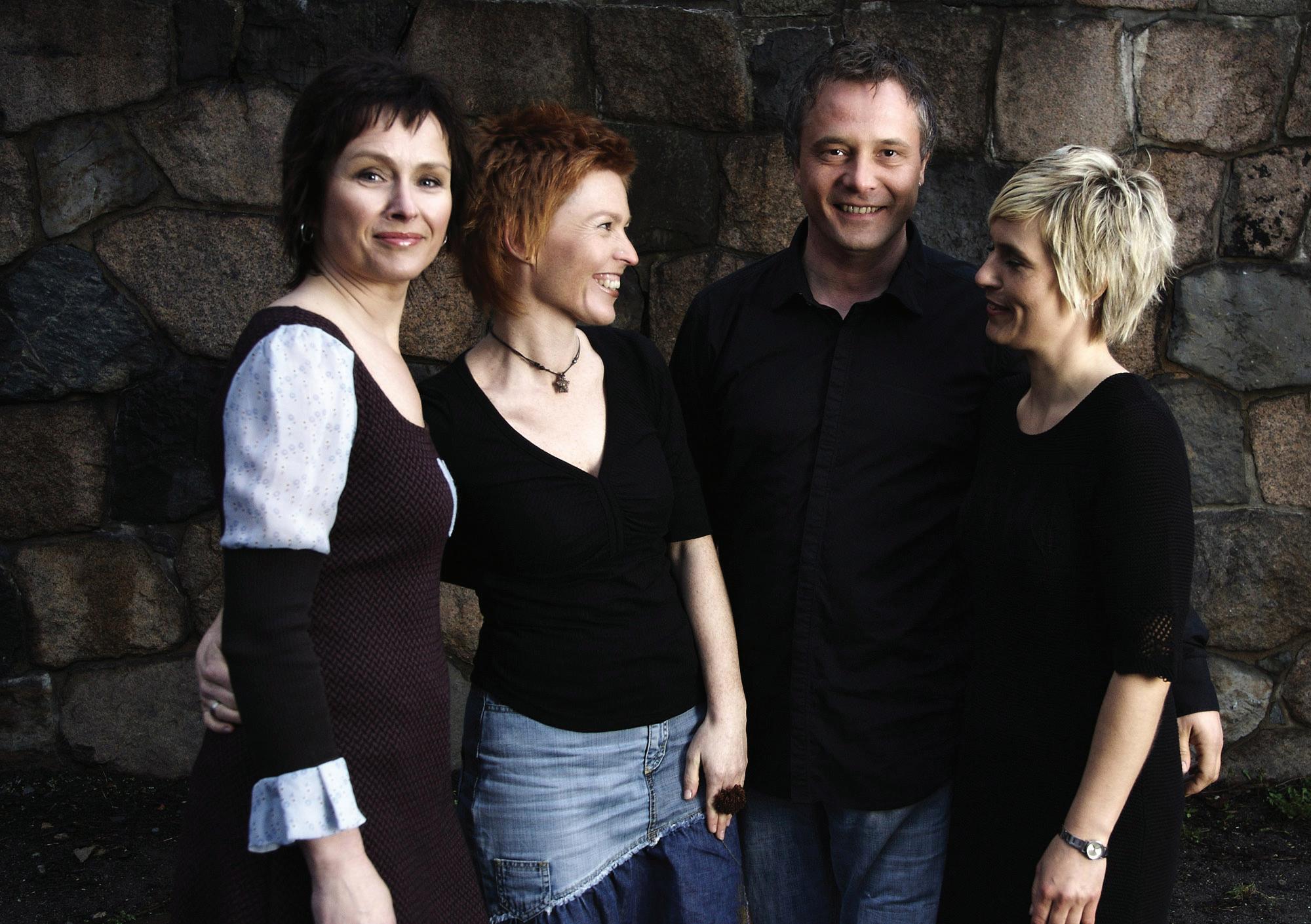Trio Mediæval
中世紀三重唱 1997 年在奧斯陸成立,發 展了三種截然不同的曲目:英國及法國 的中世紀複音音樂、當代作品以及挪威 中世紀敘事歌謠及歌曲。三重唱成立初 期,參加過在英國及德國舉行的希里亞 特夏季音樂節,期間密集的工作令三人 深受啟發;隨後師從蓮達.哈爾斯德和 約翰.波特。
中世紀三重唱曾於歐洲及美加各地舉辦音 樂會和作電台廣播; 2001 年發行首張唱 片《天使話語》,馬上榮登美國《壁報》 流行榜十大暢銷唱片; 2002 年 4 月更入 選《發燒天書》音響雜誌之每月精選唱 片。 2004 年發行的第二張唱片《夜了, 她說》,多個星期雄踞美國《壁報》流行榜 十大暢銷唱片;她們第三張唱片《海星》 已於2006 年發行。
中世紀三重唱曾合作之作曲家包括格溫. 布利亞斯、伊凡.穆迪、羅傑.馬舒、保 羅.羅賓遜、皮亞士.赫拉威爾、伊索貝 爾.戴維斯、威廉.布魯克斯、茱莉亞. 沃爾夫、大衛.朗、邁可.哥頓、阿爾巴 尼亞的托馬.希馬庫、烏克蘭之奧利.赫 卡威、墨西哥的剛薩羅.馬切雅斯、挪威 的比約恩.克魯斯、安德魯.史密斯及特 呂格韋.塞伊姆、托德.古斯塔夫森,以 及韓國的洪晟智。
2005 年 11 月,中世紀三重唱與德國「音 樂工廠」合作,在紐約布魯克林音樂學院 演出當代神劇《庇護》。《庇護》一劇由 美國作曲家三人組「Bang on a Can」創 作,糅合了投影與音樂; 2006 年初在德 國科隆和埃森作歐洲首演,繼而在阿姆斯 特丹、安特衛普和聖珀爾滕演出, 2007 年10月又在奧斯陸現代音樂節上演。
中世紀三重唱演遍美國 25 州, 2007 年底 再赴美巡迴演出,曲目包括挪威傳統民 歌、中世紀敘事歌謠及挪威節日讚美詩。
中世紀三重唱特別為該次演出,由三人 組擴充成四人組,邀得挪威敲擊樂演奏家 比爾格.米斯特利根加盟協力,陣容與在 2008年香港藝術節演出一樣。
聯合藝術管理公司為中世紀三重奏經理人。
Founded in Oslo in 1997 Trio Mediæval has developed three distinct strands of repertoire: polyphonic medieval music from England and France; contemporary works; and Norwegian medieval ballads and songs. The group’s initial phase was inspired by intense periods of work at the Hilliard Summer Festival in England and Germany, and subsequently with Linda Hirst and John Potter. Trio Mediæval has given concerts and radio broadcasts throughout Europe, the US and Canada. The ensemble released its first CD Words of the Angel in 2001 and it immediately went into the Billboard Top 10 bestsellers list and was the April 2002 Stereophile Recording of the Month. In 2004 the trio released its second CD Soir dit-elle and this recording was also on the Billboard Top 10 list for many weeks. The group released its third CD Stella Maris in 2006.
The trio has collaborated with many composers including Gavin Bryars, Ivan Moody, Roger Marsh, Paul Robinson, Piers Hellawell, Isobel Davies, William Brooks, Julia Wolfe, David Lang, Michael Gordon, Thoma Simaku (Albania), Oleh Harkavyy (Ukraine), Gonzalo Macías (Mexico), Bjørn Kruse, Andrew Smith and Trygve Seim, Tord Gustavsen (Norway) and Sungji Hong (Korea).
In November 2005 Trio Mediæval performed at the Brooklyn Academy of Music in New York, together with the German musikFabrik in Shelter; a contemporary oratorio with projections and music by the American composer-trio Bang on a Can. The work had its European premiere in Cologne and Essen in Germany in early 2006, and has since been performed in Amsterdam, Antwerp and St Pölten. The oratorio was performed in Oslo in October 2007, during the Ultima Oslo Contemporary Music Festival.
Trio Mediæval has now performed in 25 US states and at the end of 2007 it toured the US again with a programme of Norwegian traditional folk songs, medieval ballads and Norwegian holiday hymns. For this project, like the Hong Kong programme, the trio expanded into a quartet, bringing the Norwegian percussionist Birger Mistereggen as the fourth part to the group.
Alliance Artist Management is the exclusive management for Trio Mediæval.
Anna Maria Friman
安娜.瑪莉亞.費利曼生於瑞典古騰堡,在奧斯陸巴勒特.杜埃音樂學院隨托比 約恩.連德約姆學習;後負笈倫敦聖三一音樂學院,師從蓮達.哈爾斯德。費利 曼現於約克大學修讀博士學位,研究中世紀音樂的現代演出。過去七年,她既教 授聲樂,又在英國、瑞典、拉脫維亞、芬蘭及美國為多個聲樂組合提供指導。費 利曼經常與藝團合作,擔任獨唱,合作夥伴包括格溫.布利亞斯合奏團、紅色伯 特、白鸛合奏團、挪威獨唱家合唱團、 NYYD 合奏團、拉脫維亞電台合唱團、根特古樂合唱團和探求 曲合奏團。
2007年春季,費利曼參演十四行詩計劃「獨一無二的太陽」(與皇家莎士比亞劇團及北部歌劇院合作) ,在埃文河畔斯特拉特福德皇家莎士比亞劇團首演。
Born in Gothenburg, Sweden, Anna Maria Friman studied with Thorbjørn Lindhjem at the Barratt Due Institute of Music in Oslo and with Linda Hirst at Trinity College of Music in London. She is currently doing a PhD at the University of York, where she is researching the modern performance of medieval music. During the last seven years she has taught singing and coached vocal ensembles in the UK, Sweden, Latvia, Finland and the US. Friman’s solo engagements include performances with Gavin Bryars Ensemble, Red Byrd, The Ciconia Ensemble, the Norwegian Soloists’ Choir, NYYD Ensemble, Latvian Radio Choir, Collegium Vocale Gent and Ricercar Consort. In the spring of 2007 Friman performed in the Sonnets Project Nothing like the sun (a collaboration between the RSC and Opera North), which had its premiere at the Royal Shakespeare Company in Stratford Upon-Avon. 安娜.瑪莉亞.費利曼
蓮.安德烈亞.富格塞特
Linn Andrea Fuglseth
蓮.安德烈亞.富格塞特生於挪威山達霍得, 1997 年在挪威音樂學院完成聲樂 高級文憑課程,專攻巴羅克音樂演繹。1994至1995年間就讀倫敦市政廳音樂及 戲劇學院,獲早期音樂高級獨唱學文憑。她的聲樂老師包括馬利特.伊賽那、巴 布路.馬克龍德、艾瑪.克格比和瑪莉.尼古爾斯。富格塞特常與藝團合作,擔 任獨唱,合作夥伴計有斯塔萬格交響樂團、挪威巴羅克樂團以及挪威獨唱家合唱 團。富格塞特 1997 年 10 月創辦中世紀三重唱;除了演唱,她也在奧斯陸指揮一個兒童合唱團,並為 中世紀三重唱改編挪威民歌。
Linn Andrea Fuglseth was born in Sandefjord, Norway. She completed her Higher Diploma in singing at the Norwegian Academy of Music in 1997, specialising in baroque interpretation. Between 1994 and 1995 she studied at the Guildhall School of Music & Drama in London, receiving a diploma in Advanced Solo Studies in Early Music. She has studied singing with Marit Isene, Barbro Marklund, Emma Kirkby and Mary Nichols. Fuglseth has been soloist with, amongst others, the Stavanger Symphony Orchestra, the Norwegian Baroque Orchestra and the Norwegian Soloists’ Choir and founded Trio Mediæval in October 1997. In addition to singing, she conducts a children’s choir in Oslo and writes arrangements of Norwegian folk songs for the trio.
托魯恩.厄斯特蘭姆.奧森
Torunn Østrem Ossum
托魯恩.厄斯特蘭姆.奧森生於挪威那姆索斯,早年就讀奧斯陸幼兒教育學院, 專攻音樂及戲劇,又在奧斯陸倫寧根郡學院求學,師從思韋恩.比約奎。她有豐 富的小組演唱經驗,又經常與藝團合作,包括挪威獨唱家合唱團、北歐之音、神 氣合唱團,曾擔任卡爾.赫格塞特指揮的歌唱羊群合唱團的獨唱。奧森也在迷你 百慕達青少年劇團教授聲樂;她對兒童尤其熟悉,這對於中世紀三重唱有很大幫 助──因為她們經常由挪威音樂會學院安排,巡迴挪威舉行學校音樂會。
Torunn Østrem Ossum was born in Namsos, Norway. She was educated at the College of Early Childhood Education in Oslo, specialising in music and drama. Ossum studied singing with Svein Bjørkøy at Rønningen County College in Oslo. She has wide experience as an ensemble singer and has performed with groups such as the Norwegian Soloists’ Choir, Nordic Voices, Con Spirito and Grex Vocalis, conducted by Carl Høgset, where she also sings as a soloist. Ossum has been working as a vocal coach for the junior theatre group ‘Bærmuda mini’. Her experience working with children has been a great advantage for the trio, who tour throughout Norway giving school concerts, arranged by the Norwegian Concert Institute.
比爾格.米斯特利根
Birger Mistereggan
比爾格.米斯特利根生於挪威海德馬克郡,專攻傳統挪威鼓樂及民間音樂,現於 奧斯陸挪威電台樂團擔任敲擊樂手/定音鼓手,也在特隆賽大學任教。米斯特利 根也經常出任烏勒.布爾音樂學院及奧斯陸的挪威音樂學院的客席講師。過去七 年,他經常與中世紀三重唱攜手,又在她們最新的ECM唱片《民歌》中演出。
Born in Rendalen, Norway, Birger Mistereggen specialises in traditional Norwegian drumming and folk music, and is currently working as a percussionist/timpanist in the Norwegian Radio Orchestra in Oslo. He also teaches at Tromsø University College and is a regular guest lecturer at Ole Bull Academy and at the Norwegian Academy of Music in Oslo. Over the past seven years, Mistereggan has played with Trio Mediæval on many occasions and appears on their new ECM recording, Folk Songs
三聲部康都曲:
高貴的花朵
蒙福的肉身
三次不認主
佚名,英國,十三世紀
歡迎,榮耀的女皇 (讚歌VII)
格溫.布利亞斯 (2003)*
歡迎,慈悲之母
歡迎,貞女中的貞女 慈悲的聖母 / 羅賓,靜靜 佚名,英國,十三世紀
讚歌:
天啊,我累透了 佚名,意大利,十三世紀
羔羊頌
選自《「來自光中之光」彌撒曲》
洪晟智 (2002)*
— 中場休息 —
牧牛歌
挪威西富爾德郡
編曲: 童恩.克魯恩
口簧獨奏 (純器樂)
編曲: 比爾格.米斯特利根
這小孩
挪威特勒馬克,中世紀敘事歌謠
編曲:童恩.克魯恩
現在歇歇吧,可愛的孩子
挪威西富爾德郡
編曲: 童恩.克魯恩
舞吧,別哭了
挪威奧斯陸
詞 / 曲:利勒楊恩.尼爾遜
編曲: 蓮.安德烈亞.富格塞特
輕狂的青葱歲月
特勒馬克
編曲: 安德魯.史密斯
Three-voice conductus:
Flos Regalis (The Royal Flower)
Beata Viscera (The Blessed Flesh)
Quem Trina Polluit
(Whom the Threefold Denial Defiled)
Anon., England, 13th century
Ave Regina Gloriosa (Lauda VII)
(Hail, Glorious Queen)
Gavin Bryars (2003)*
Salve Mater Misericordie (Hail, Mother of Mercy)
Salve Virgo Virginum (Hail, Maid of Maidens)
Sancta Mater / Dou way Robyn (Holy Mother of Grace / Hush, Robin)
Anon., England, 13th century
Lauda:
Oi me lasso (Alas, I am weary)
Anon., Italy, 13th century
Agnus Dei (Lamb of God)
From Missa Lumen de Lumine
Sungji Hong (2002)*
— Interval —
Till, till Tove
Vestfold, Norway
Arranged by Tone Krohn
Jew’s harp solo (instrumental)
Birger Mistereggen
Det lisle bånet (The Little Child)
Telemark, Norway, Medieval ballad
Arranged by Tone Krohn
So ro, godt barn (Rest now, sweet child)
Vestfold, Norway
Arranged by Tone Krohn
Danse, ikke gråte nå (Dance, do not cry now)
Oslo, Norway
Text / melody: Lillebjørn Nilsen
Arranged by Linn Andrea Fuglseth
I mine kåte ungdomsdagar
(In my reckless, youthful days)
Telemark, Norway
Arranged by Andrew Smith
延迪尼斯搖籃曲
挪威約頓黑姆山脈
作曲: 葛利格
原唱:凱亞.延迪尼斯.斯拉利安 編曲: 蓮.安德烈亞.富格塞特
古德布朗茨山谷的結婚進行曲
編曲: 童恩.克魯恩 (無詞演唱)
羅蘭德之歌
中世紀敘事歌謠
編曲: 蓮.安德烈亞.富格塞特
太陽禱文
挪威特勒馬克
原唱:貝列特.奧費埃姆
編曲:蓮.安德烈亞.富格塞特
露法.利恩
挪威西阿格德爾
原唱:克爾斯頓.布拉頓.伯格
編曲: 蓮.安德烈亞.富格塞特
西富爾德舞曲
挪威西富爾德
原唱:波格.克魯克
編曲:童恩.克魯恩 (無詞演唱)
我不太緬懷過去
挪威特勒馬克
編曲:提利爾統格
特魯貝斯拉特
挪威傳統鼓樂
比爾格.米斯特利根 (無詞演唱)
小偷
中世紀敘事歌謠,挪威南部 原唱:克爾斯頓.布拉頓.伯格
編曲:蓮.安德烈亞.富格塞特
* 特別為中世紀三重唱而作的樂曲
所有敲擊 / 口簧聲部均由比爾格.米斯特利根 改編。歌曲與演出次序或有更改
Gjendines Bådnlåt (Gjendine’s Lullaby)
Jotunheimen, Norway
By Edvard Grieg, after Kaia Gjendine Slaalien
Arranged by Linn Andrea Fuglseth
Bruremarsj frå Gudbrandsdalen
(Wedding March from Gudbrandsdalen)
Arranged by Tone Krohn (no text)
Rolandskvadet (The Song of Roland)
Medieval ballad
Arranged by Linn Andrea Fuglseth
Solbønn (Sun-prayer)
Telemark, Norway
After Berit Opheim
Arranged by Linn Andrea Fuglseth
Lova Line
Vest-Agder, Norway
After Kirsten Bråten Berg
Arranged by Linn Andrea Fuglseth
Springdans fra Vestfold (Dance from Vestfold)
Vestfold, Norway
After Borger Kruke
Arranged by Tone Krohn (no text)
Eg aktar inkje mykje hine gutan
(I don’t think much of those boys)
Telemark, Norway
Arranged by Tiriltunga
Trumbeslaat
Traditional Norwegian drumming
Birger Mistereggen (no text)
Tjovane (The Thieves)
Southern Norway, Medieval ballad
After Kirsten Bråten Berg
Arranged by Linn Andrea Fuglseth
* denotes work written for the Trio Mediæval
All parts for percussion/jew’s harp arranged by Birger Mistereggen. Songs and their order of performance are subject to change
聖樂與現代音樂
過去,大量中世紀樂譜毀於戰火、毀於教會、毀 於時人品味轉變;而在英國,古譜的保存模式更 極為零散。現存的大概僅屬冰山一角,有些古 譜更是在不可思議的情況下保存下來。今天節目 裏的英語複音樂曲於十三世紀完成,作者已不可 考;原曲應該頗長,但現在只剩斷簡殘篇。之
後一個世紀,隨着百年戰爭結束,人民更有安全 感,民生也見改善,瑪利亞崇拜──創作複音作 品的巨大原動力──可說達到頂峰。《慈悲的聖 母/羅賓,靜靜》是首十三世紀的英國經文歌, 糅合了拉丁文讚美詩與英文世俗歌曲(原曲也許是 民歌。經文歌抽取了其中一句作為固定聲部),非 常獨特。拉丁文讚美詩頌讚瑪利亞,而固定聲部 的原詞則是「羅賓,靜靜,嬰孩會哭呢⋯⋯」。
今天的節目裏有一首意大利讚歌,《天啊,我累 透了》,寫於 12 世紀左右,作者已不可考。「讚 歌」根據讚美聖母的詩譜曲;這種情懷早見於基 督教音樂萌芽時期;原詩結構並不繁複,只是簡 單的韻文和副歌──這種形式本身可能歷史更為 悠久。
格溫.布利亞斯把同一段歌詞重新譜曲(他至今已將另外 35 首同類歌詞 重新譜曲),根據作者不詳的原文引伸出額外聲部和織體,同時保存其古 老輪廓。這位作曲家既與中古範式打交道,又要顧及活生生的女高音聲 線。他形容寫作這類樂曲的挑戰時說:「如此坦蕩又毫無修飾──比方 說,無法借助配器圓熟的伴奏來掩飾──就像一個畫家向來只在巨幅油 畫布上畫濃稠油彩,現在卻不得不在普通紙張上用鋼筆墨水畫圖,非黑 即白,像禪宗藝術家一揮而就,從不修正。」《歡迎,榮耀的女皇》乃布 利亞斯2003年為中世紀三重唱而寫的作品。
《「來自光中之光」彌撒曲》乃洪晟智 2002 年為中世紀三重唱而寫的 作品。作曲家在曲中探索不同的主要音域和織體,產生精巧的聲音。今 次演出的《羔羊頌》運用質樸、頗為靜態的主音和聲,呼應《光榮頌》 「除免世罪者,求你垂憐我們」一句:作曲家指示各聲部要「像鐘聲一 樣」,唱出效果開闊的和聲。織體雖偶爾用模仿法開展,但整體效果仍以 寂靜空曠、深思沉穩為主。洪晟智的音樂既錯綜複雜又細膩精緻,總覺 平易近人。達到這種效果的原因有二:其一,她希望聽眾留意的,總能 通過千變萬化的織體成功地吸引聽眾注意;其二,她不斷探索各種不同 色彩、意象與音色。她的音色世界不但可見家鄉韓國的影響,更可見電 子原音音樂重視音色的特質。
民歌
我們三人自1997年合作至今,曲目一直包括聖樂、當代作品、挪威民歌 以及中世紀敘事歌謠。雖然我們都不是學民間音樂出身,但曾幾何時,
這些音樂卻經常伴隨左右──這些都是我們自小聽着成長的歌。用自己 母語演唱、將歌曲改編以遷就個人聲線,整個過程很是令人振奮。
蓮.安德烈亞.富格塞特受多位民間音樂家的演出啟發,被美妙的旋 律、和聲及節奏結構深深吸引,遂將其中部份歌曲改編給我們演出。這 些民間音樂家包括克爾斯頓.布拉頓.伯格、桑德利.布拉蘭德、安格 尼斯.布恩.格爾納斯、貝列特.奧費埃姆、烏尼.洛夫列德、「提利 爾統格」(全女班三重唱)以及童恩.克魯恩。童恩.克魯恩來自挪威南 部西富爾德郡(這個地區的民間音樂還不特別著名),跟富格塞特是同 鄉。克魯恩收集了許多家鄉曲調,也為我們改編了不少民歌。我們興幸 能與她緊密合作。
挪威民歌特色之一是「無詞演唱」(稱為「杜令」tulling、「素令」sulling 或「特拉令」tralling)──由歌者自創或即興演唱一連串輔音。舞曲的特 色是節奏感強烈、步伐普遍急促、拍子不平均和帶有器樂化的樂段,歌 者遂利用爆破音和鼻輔音,配合相對較輕的元音自創音節。例如,「特拉 ─迪─達─迪─達迪─丹─迪─達等迪達」就是典型的「無詞演唱」音 節群(如《西富爾德舞曲》、《布魯列瑪斯》和《我不太緬懷過去》), 類似蘇格蘭和愛爾蘭的傳統「口技音樂」。另外一種傳統唱法稱為「洛 克」或「拉令」──意指一些晚上用以在山地牧場召回牛群的短音,也 是遠距離通訊的好方法(如《牧牛歌》)。除了以上的特殊唱法外,歌 詞也是很重要的元素。
不同地方有不同文化、語言和方言,音樂的表達形式也不例外。挪威民 間音樂經常將一首歌曲或歌謠跟特定地方、事件甚至個人拉上關係。我 們不談民歌作曲家,但習慣指出一首歌曲的原唱者:我們會用「繼(﹝某 人)而唱」表示,意謂「某人原唱」。我們指明自己從誰人聽過或學會這 個曲調,儘管這些曲調其實世世代代口耳相傳。
這些年來,中世紀三重唱一直深受合唱組合「提利爾統格」啟發,獲益 良多。我們第一次一起聽到「提利爾統格」的演出是在2002年。當時我 們穿梭多所學校巡迴演出,車子一邊駛過挪威北部的荒蕪地帶,一邊隨 着收音機播出的音樂一起唱,試着邊唱邊找出各個聲部、裝飾音、以及 無詞演唱的風格。後來,安德魯.史密斯給我們譯寫了他們幾首改編民 歌。大概就是那次旅程期間,我們認真考慮演出純挪威民歌音樂會,並 邀請精通傳統挪威鼓樂的敲擊樂演奏家比爾格.米斯特利根助陣。我們 曾跟米斯特利根合作過數次,鼓、口簧琴和其他敲擊樂為我們人聲所加 的各種織體與節奏的起伏律動,令我們大感好奇。雖然這種組合頗不尋 常,但我們卻很喜歡樂器與自己的聲線所產生的平衡效果。
在挪威,利用繩索控制鼓面的張力的技術大概可追溯至中世紀。1928 年 左右,挪威建立了獨立軍隊,每個軍團都渴望有自己的鼓手。與軍隊的 淵源意味着鼓是極受尊崇的樂器:鼓手經常獲邀參與婚禮、舞會及其他 慶祝活動。因此,軍鼓也成了民間音樂傳統的一部份。婚禮上,新娘出 入教堂的時候,鼓手會奏出婚禮進行曲;賓客到場時,鼓手也負責宣告 賓客光臨並歡迎來賓;婚宴通常長達三天,在第二及第三天早上,鼓手 會喚醒賓客參與新一輪慶祝活動。這些習俗一直持續到二十世紀,直至 1940 年代挪威某些地區仍然保持這些傳統。但隨着舊式軍隊制度瓦解, 軍樂傳統也漸漸煙消雲散。要不是1915至1935年間約翰尼斯.松德霍把 挪威鼓樂譯寫下來,傳統鼓樂就差不多要失傳了。
十九世紀中葉以前,鮮有收集或譯寫民間音樂的活動。1948 年,魯德維 奇.馬蒂亞斯.林德曼開始在挪威鄉郊蒐集音樂;大約同期,幾位著名 小提琴手也開始蒐集及譯寫民間音樂材料。1814 年挪威脫離丹麥獨立; 到了這時大家都熱中於建立國家認同感。作曲家如林德曼、約翰.哈爾 霍森、葛利格等人跨越了民間音樂與藝術音樂之間的鴻溝,作品糅合傳 統元素,使民間音樂漸受有學識的中產城市人注意。十九世紀的挪威開 國元勳大概希望民間音樂也徹底源自挪威,可是事實並非如此──挪威 民間音樂的來源無疑相當國際化。比方說,讚美詩《來吧,世間的救贖 主》出自「艾因西德倫古譜」,已有過千年歷史;在我們的演繹中,則 披上了挪威宗教民歌的外衣(《萬國的救贖主,來吧》)。
我們希望是次演出能對此一活生生的口頭傳統有所貢獻;雖然這些歌曲 已帶有我們的音樂痕跡,但前人的影響也誠然是樂曲的一部份。
節目介紹:中世紀三重唱
Folk Songs
Norwegian folk songs and medieval ballads have complemented our repertoire of sacred music and contemporary pieces since we began singing together in 1997. Although none of us in the trio grew up as folk musicians, we were nevertheless surrounded by folk music. These are songs we have known since childhood. Singing them in our native language and adapting them to suit our voices and sound has been an exciting process
Fascinated by their beautiful melodies, harmonies and rhythmic structures, Linn Andrea Fuglseth arranged some of the songs for the group, inspired by the performances of, among others, Kirsten Bråten Berg, Sondre Bratland, Agnes Buen Garnås, Berit Opheim, Unni Løvlid, the all-female vocal trio Tiriltunga and Tone Krohn. Krohn has collected many tunes from her home county of Vestfold in southern Norway (not especially known for its folk music), where Fuglseth also grew up. We have been fortunate to work closely with Krohn, who has arranged many of the folk songs in our repertoire.
One of the sound-worlds that make Norwegian vocal folk music so distinctive is the tradition of singing without words, a style known as tulling, sulling or tralling in which a sequence of consonants is invented or improvised by the singer. In dance music, which is characterised by rhythmic, often rapid, instrumentalsounding passages and uneven beats, singers create their own sounds using plosives and nasal consonants with relatively light vowels. A typical ‘tralling’ sequence (as in Springdans, Bruremarsj, Eg aktar inkje) might be “tra di da di dadi damm di dadndidå”. This is very similar to the Scottish and Irish tradition known as ‘mouth music’. There is also a type of traditional singing known as lokk or laling, short motifs sung to call home cattle at night on mountain farms, and also an effective means of communication over long distances (as in Till, till Tove). With the exception of the styles of singing above, the text is an important element in the vocal folk music tradition.
In the same way that cultures, languages and dialects vary from place to place, so too, do forms of musical expression. Folk music in Norway has a strong tradition of connecting a certain song or ballad to a specific place, event or even to a specific person. In folk music we don’t talk about composers, but we have a custom of acknowledging a performer as the source of a particular song by using the term ‘after’, meaning ‘as sung by’. We mention only the source from which we ourselves have heard and learnt the tune, although it has been handed down orally for generations.
Trio Mediæval is especially indebted to the group Tiriltunga, who have greatly inspired us through the years. The first time we heard Tiriltunga together was in 2000 during a school concert tour, listening to the car stereo while
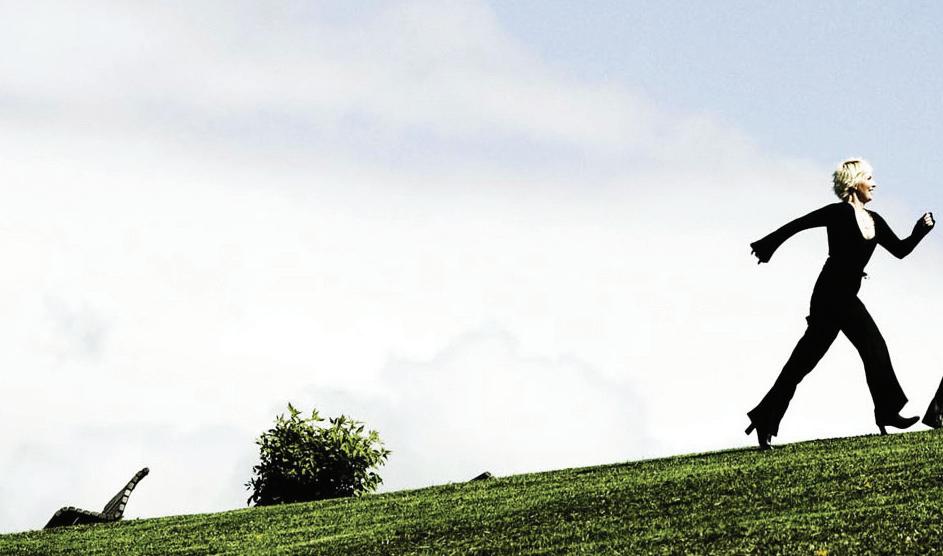
driving mile after mile through the desolate north-Norwegian landscape. We sang along and tried to figure out the different parts, ornaments and style of ‘tralling’, and Andrew Smith subsequently transcribed a few of their arrangements for us. It was probably during that tour that we started to think seriously of putting together an all-Norwegian programme and inviting percussionist Birger Mistereggen, who specialises in traditional Norwegian drumming, to join us. We had worked with Mistereggen on several occasions in the past and were intrigued by the various textures and rhythmic grooves which the drum, jew’s harp and other percussion instruments added to our vocal performance. Even though this is an unusual constellation, we like the way these instruments act as a counterweight to our voices.
In Norway, the use of rope-tensioned drums probably goes back as far as medieval times. Around 1628, when Norway founded its own independent army, each regiment aspired to have drummers of its own. The military connection meant that the drum became a highly respected instrument, and drummers were frequently engaged to play for weddings, dances and other celebrations. Thus the military drum tradition also became a folk music tradition. At weddings the drummer would play the bridal procession to and from the church; he would announce and welcome the guests as they arrived; and on the second and third days of what was usually a three-day wedding feast he would wake the guests in the morning for a new round of celebrations. These traditions lasted into the 20th century (as late as 1940 in some parts of the country), but slowly disappeared along with the old
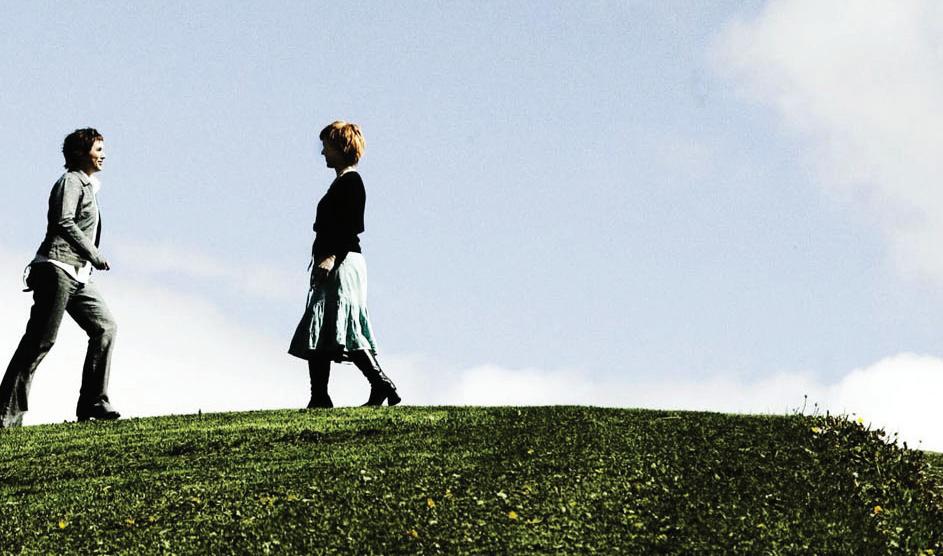
military system. Had it not been for Johannes Sundvor’s transcriptions of Norwegian drum music, written down between 1915 and 1935, very little of it would have survived.
Until the mid-19th century very little folk music had been collected and transcribed. In 1848 Ludvig Mathias Lindeman began compiling music from the rural areas of Norway, at roughly the same time that several prominent fiddlers also set about collecting and transcribing material. It was a period of fervent searching for a national identity following Norway’s independence from Denmark in 1814. Composers such as Lindeman, Johan Halvorsen and Edvard Grieg bridged the gap between folk music and art music, incorporating traditional elements in their compositions and bringing folk music to the attention of the urban, educated middle classes. The origins of folk music are doubtless more international than Norway’s 19th-century nation builders would have liked to admit. The hymn Veni Redemptor Gentium, for instance, from the millennium-old Einsiedeln manuscript, has assumed the guise of a Norwegian religious folk tune in our interpretation (Folkefrelsar, til oss kom).
We would like to see this performance as our contribution to a living, oral tradition; although these songs bear our musical imprint, they are coloured by all those who have performed and passed on the music before us.
All programme notes by Trio Mediæval and Birger Mistereggen
Flos Regalis
The Royal Flower
高貴的花朵
Beata Viscera
The Blessed Flesh
蒙福的肉身
Quem Trina Polluit
Whom the Threefold Denial
Defiled
三次不認主
Flos regalis
virginalis
chori dux egregia quam Iesse natam esse stripe constat regia. Rosa fragrans, primula vernalis, servos tuos libera de malis.
Rex te salem ad regalem introduxit thalamum flos decoris et honoris precellentis balsamum. Tu glorie speculum, solis umbraculum, da famulis gaudium.
Beata viscera
Marie virginis, Que fructo gravida
Eterni germinis; In vite poculo
Propinat seculo [Pro mala hominis Potum] dulcedinis.
Quem trina polluit
prius negatio, peccatum diluit trina confessio: qui purum abliut, Petrum admonuit veri iudicio.
A petra diceri, O Petre, rectius, eo quod ceteris, in fide firmius; mille sustinuit penas martyrio. Mille sustinuit Palmas in premio
The royal flower the glorious leader of the virginal chorus, whom, they say, was born from Jesse’s royal stem O fragrant rose, first bud of spring, free thy servants from evils. The King has led you pure into his royal chamber, O flower of elegance and honour, surpassing all fragrance. You are a mirror of glory, shade for the sun: grant joy to your servants.
Hail the blessed flesh Of the virgin Mary, Which was laden with fruit Of the eternal seed In the cup of life. She offers to the world, On behalf of man’s evils, The draught of sweetness.
Whom earlier the threefold denial defiled, his sin was softened by a threefold confession; he who washed him pure, chided Peter by a judgment of truth.
Thou wast said to come from a rock, O Peter, more righteously than the others, and in faith more firm; he who sustained a thousand punishments in martyrdom, now holds a thousand palms in reward.
高貴的花朵 貞女齊聲頌讚的 光榮領袖, 人人都說,
她出身
耶西高貴的血脈 芬芳的玫瑰、春天第一顆花蕾, 釋放你的僕人,脫離邪惡。
君王 把純潔的你 帶進祂的內室。
優雅的花朵 貞潔的花朵, 芳香無與倫比。
你是榮耀的鏡子, 太陽下的蔭庇: 賜喜樂予你的僕人。
蒙福的肉身, 童貞瑪利亞的肉身, 身上果實 藏着永恆的種子, 沉浸在生命之杯裏。 只因人類的邪惡, 她就為世間 滿杯香甜。
那個前陣子 三次不認主的人, 他的罪現在得以減輕, 全因他三次懺悔; 那把他洗淨的, 按至理判斷, 責怪彼得。
有人說你自盤石中來, 彼得,你比眾人 更公正, 信心也更堅定; 那捱過了 千般折磨的, 現在手握 千塊棕櫚葉作回報。
Ave Regina Gloriosa
Hail, Glorious Queen
歡迎,榮耀的皇后
Salve Mater Misericordie
Hail, Mother of Mercy
歡迎,慈悲之母
Post lapsum steteris, et dimicaveris cruce nobilius; qui sic promeruit nobis ut meruit perfrui gaudio.
Ave, regina gloriosa, plena d’ogne consolança.
Ave, pulcra margarita, splendida luce clarita; fresca rosa et aulorita, nostro gaudio et alegrança.
Ave, regina gloriosa, plena d’ogne consolança.
Ave, regina adorata, virgene madre beata; poi ke fosti salutata, madre se’ de gran pietança.
Ave, regina gloriosa, plena d’ogne consolança.
Ave, porto de salute; ki ben t’ama tu l’aiute; guardane di far cadute, tràici for de dubitança.
Ave, regina gloriosa, plena d’ogne consolança.
Salve mater misericordie
Stella maris decus ecclesie
Porta via celestis curie
Mundi salus et datrix venie.
Que portasti regem justitie
Miro modo non nostra serie
Miserere huius familie
Et a malis serva nos hodie.
After they lapse thou didst hold firm, and did fight by the Cross most gloriously; thus as he gained merit for us, so did he deserve to enjoy eternal joy.
Hail, glorious queen, full of all consolation.
Hail, beautiful pearl, clear shining light; fresh rose and fragrance, our joy and delight.
Hail, glorious queen, full of all consolation.
Hail, adored queen, blessed virgin mother; since you received your salutation you have been our mother of great holiness.
Hail, glorious queen, full of all consolation.
Hail, gateway of salvation; you help whoever loves you well; save him from falling into error, and keep us free from doubting thoughts.
Hail, glorious queen, full of all consolation.
Hail, Mother of Mercy, Star of the Ocean and Highest glory of the church; You are the gateway of the court of heaven, The salvation of the world and the giver of pardon.
You who bore the King of Righteousness In miraculous manner, not from our lineage; Have mercy on this family, And keep us safe from evil this day.
人人都叛離,你獨堅持, 你也的確在十架旁 戰鬥得最英勇; 所以既然他為吾等 積聚了功勞,他應享受 永恆的喜樂。
歡迎,榮耀的皇后 總令人感到安慰。
歡迎,美麗的珍珠, 澄明清澈之光; 初綻的玫瑰與芳香, 吾等的喜樂與歡欣。
歡迎,榮耀的皇后 總令人感到安慰。
歡迎,備受尊崇皇后, 蒙福的童貞聖母; 自你接受吾等致意後, 你就是吾等偉大的聖母。
歡迎,榮耀的皇后 總令人感到安慰。
歡迎,救贖之道; 凡愛你的,你都幫助; 免他誤入歧途, 免卻吾等思疑。
歡迎,榮耀的皇后 總令人感到安慰。
歡迎,慈悲之母, 海洋之星, 教會的至高榮耀, 你是通往天國之道, 世間的救贖、寬恕者。
你憑神蹟懷胎 生下仁義之王,並非吾等血脈, 請憐憫這家庭, 今日讓我們脫離凶惡。
Salve Virgo Virginum
Hail, Maid of Maidens
歡迎,貞女中的貞女
Sancta Mater / Dou Way, Robyn
Holy Mother of Grace / Hush, Robin
Salve virgo virginum
Parens genitoris, Salve lumen luminum, Radius splendoris.
Salve flos convallium, Stilla veri roris, Nostra spes in te.
Salve virgo regia
Porta salutaris, Veri viri nescia, Quia decum paris.
Ave quia deica
Prole fecundatis, Nostra spes in te
Ave nostre spei
Finis et salutis, Ave per quam rei
Letantur cum tutis.
Ave speciei
Decus et salutis, Nostra spes in te.
Sancta mater gratiae, stella claritatis visita nos hodie plena pietatis.
Veni, vena veniae mox incarceratis, solamen angustiae, fons suavitatis.
Recordare, mater Christi, quam; amare tu flevisti juxta crucem tu stetisti, suspirando viso tristi.
O, Maria, flos regalis, inter omnes nulla talis; Tuo nato specialis nostrae carnis parce malis
O, quam corde supplici locuta fuisti, Gabrielis nunci i cum verba cepisti.
’En ancilla Domini’, propere dixisti; vernum vivi gaudii post hoc perperisti.
Gaude, digna, tam benigna caeli solio; tuos natos, morbo stratos, redde filio.
Hail, maid of maidens, Mother of the creator; Hail, light of lights, Beam of shining brightness; Hail, flower of the valleys, Drop of pure dew, Our hope is in you.
Hail, royal maiden, Gate of salvation, Who never knew a man, Because you gave birth to God. Hail to you, because you were fruitful With a divine offspring; Our hope is in you.
Hail, final point of our hope And our salvation; Hail to you, the one through whom The accused rejoice with the saved; Hail, model of beauty and salvation; Our hope is in you.
Holy mother of grace, star of brightness, visit us today, full of compassion.
Come soon, channel of pardon, to those in prison, as a solace of misery, a source of sweetness.
Remember, mother of Christ, how bitterly thou didst weep; thou didst stand beside the cross sighing at the sad sight.
O Mary, royal flower, among all women nonesuch, in thy son unequalled, forgive the sins of our flesh.
O, with how humble a heart thou didst speak when thou didst receive the words of Gabriel the messenger.
‘Behold the handmaid of the Lord’, thou didst quickly say; thereafter thou didst bear the springtime of living joy.
Rejoice, worthy lady, so gracious, in the throne of heaven; restore thy children, brought low by vice, to the Son.
歡迎,貞女中的貞女, 創造主之母; 歡迎,光中之光, 閃耀的光線; 歡迎,山谷中的花朵, 純淨露水的水滴, 吾等盼望都在你。
歡迎,高貴的貞女, 救贖的大門, 不曾認識一個人, 因為你生下了神。
歡迎你,因為你 生下神聖的後裔; 吾等盼望都在你。
歡迎,吾等的最終盼望 與救贖; 歡迎你,全賴你 罪人與得救的人方能共歡; 歡迎, 美與救贖的模範; 吾等盼望都在你。
慈悲的聖母,光輝之星, 今天來看望吾等,充滿垂憫。
快來啊,對被囚的人,你是赦免的途徑、 困頓中的安慰、甜美的泉源。
別忘了,基督之母, 你曾經哭得多麼淒苦; 看着悽涼的情境, 站在十架旁悲嘆。
瑪利亞,高貴的花朵,女中至尊, 在你無可比擬的兒子,赦免吾等肉身的過錯。
天使加伯利把消息告訴你的時候, 你的心何等謙卑。
「我是主的侍女。」
你很快答道; 今後懷着春日鮮活的喜悅。
喜樂啊,可敬的女子,多麼慈祥, 就在天國寶座上; 你的孩子因罪而墮落, 把他們歸給人子。
Oi Me Lasso
Alas, I am weary
天啊,我累透了
Agnus Dei
Lamb of God
羔羊頌
Dou way, Robyn, the child wile weepe; dou way Robyn.
Oi me lasso
E freddo lo mio core
Ke non sospiro
Tanto per amore
Ke tu non morisse?
Morire dovaresti, Falso sconoscente, Villano, cieco, pigro E negligente, Ke per amor non vivi fervente
Si ke languisce.
Oi me lasso…
Perire potaresti, Si non se’defeso Dal grande amor Jesu
Da cui se’ateso: Volte abracciare e sta en croce desteso
E parturisce.
Oi me lasso…
Transmotisci, cuore E va’gridando E pure amore amorando, Ke no l’ai puramente amato
Va dolorando E parturisce.
Oi me lasso…
Agnus Dei, qui tollis peccata mundi, miserere nobis.
Agnus Dei, qui tollis peccata mundi, dona nobis pacem. - Interval -
Stop it, Robin, the child will weep; stop it, Robin.
Alas, I am weary, My heart is cold; Have I no sighs left For such great love, To stop you from dying?
It is you, my soul, that should have died, False, ungrateful, Boorish, blind, lazy and careless; Who even for such love will not live ardently, So that you wither away.
Alas, I am weary...
You could have died, my soul, If you had not been defended By the great love of Jesus, Who waits for you; He wants to embrace you, and is stretched out on the cross, And is in great travail.
Alas, I am weary...
Reform yourself, my heart, Go out shouting, And loving with pure love; Because you have not loved him purely, He goes grieving, And is in great travail.
Alas, I am weary...
Lamb of God, who takes away the sins of the world, have mercy on us. Lamb of God, who takes away the sins of the world, Give us peace.
— Interval —
靜靜,羅賓。孩子會哭呢; 靜靜,羅賓。
天啊,我累透了, 心很冷;
我難道沒有剩下的歎息 可以為了這大愛, 不讓你死?
該死的是我的靈魂, 虛假、忘恩負義、 粗魯、盲目、懶惰 又粗心大意; 即使為了這愛也不好好生活, 所以你也漸漸消亡。
天啊,我累極了⋯⋯
我的靈魂哪,要不是 有耶穌大愛保護, 你大概已經死了。
耶穌在等你; 祂想擁抱你, 在十架上張着手, 受盡痛苦。
天啊,我累極了⋯⋯ 我的心,改過吧, 走出去,高聲呼叫, 單純地愛; 因為你以往沒有單純地愛祂, 祂苦惱着, 受盡痛苦。
天啊,我累極了⋯⋯
除免世罪的天主羔羊 求你垂憐我們 除免世罪的天主羔羊 求你賜給我們平安
Det lisle bånet
The Little Child
Till, till Tove
tolv mand i skoge.
Tolv mand vare di, tolv mand svare di.
Store stuten stinga di, Bjøllekua binda di, Gjeslehølingen dengde di, Fehunden flengde di
Alt det andre lause fe dro di langt oppover åsane.
Franse og Skaute
sto høgt oppå Dårefjell og raute.
Der hørte jeg mi Litago, ho rauta, ho sauta.
Men jeg torde inte svara ho.
Å, Gullmund han ville te gjestebod fara, Sådomereven, kå gjorde han der?
Å, reven sku taka gjæsann i vari.
Bånet dotte, blomekinna.
Han lokka reven av bosjen inn.
Å, Gullmund han kom seg av gjestebodi heim, Sådomereven, kå gjorde han der?
Å fyri satt reven, den valboren svein.
Bånet dotte, blomekinna.
Han lokka reven av bosjen inn.
Å, kjære Gullmund, du biar meg ei stund, Sådomereven, kå gjorde han der?
Ti eg fær skifte mine sjælegaver um
Bånet dotte, blomekinna.
Han lokka reven av bosjen inn.
Det lisle bånet gjev eg min skalle, Sådomereven, kå gjorde han der?
Han må så titt i golvet falle.
Bånet dotte, blomekinna.
Han lokka reven av bosjen inn.
Klokkaren gjeve eg min tunge, Sådomereven, kå gjorde han der?
Han må så ofte baa les og sjunge.
Bånet dotte, blomekinna.
Han lokka reven av bosjen inn.
Till, till Tove
Twelve men in the forest, twelve men were they. They stabbed the bull, tied up the bell cow, beat the herdsman, and slashed the farm dog. They led the rest of the cattle far into the hills. Franse and Skaute were high up on Dåre mountain, calling. There I heard my dear Litago, mooing and moaning. But I dared not answer her.
Gullmund was off, he’d been asked to a feast Foolish fox, what was he up to? and the fox was left to guard the geese. The baby fell down, cheeks all rosy, and lured the fox inside.
Gullmund returned from the banquet and saw Foolish fox, what was he up to? a satisfied creature, the fox by the door. The baby fell down, cheeks all rosy, and lured the fox inside.
Dear Gullmund, stay with me a while, Foolish fox, what was he up to? until I’ve changed my ways. The baby fell down, cheeks all rosy, and lured the fox inside.
To the little child I’ll give my skull, Foolish fox, what was he up to? for he seems prone to fall. The baby fell down, cheeks all rosy, and lured the fox inside.
To the sexton I’ll give my tongue, Foolish fox, what was he up to? for he often has to read and sing. The baby fell down, cheeks all rosy, and lured the fox inside.
德─德─都芙
森林裏有十二個男人, 他們共有十二人。
他們刺傷公牛, 捆住繫着牛鈴的母牛, 打傷牧人,
揮刀狂砍農場狗。
帶着餘下的牛 走進深山。
法蘭斯和斯考特 在達利山高處呼喊。
在那裏,我也聽到親愛的利塔戈 在低鳴,在嗚咽。
我卻不敢應答。
顧爾蒙德飲宴去, 蠢狐狸在幹什麼? 留下狐狸來守鵝。
掉下的孩兒面紅紅, 引誘狐狸進屋來。
顧爾蒙德歡宴歸,卻見 蠢狐狸在幹什麼? 門邊狐狸滿足貌。
掉下的孩兒面紅紅, 引誘狐狸進屋來。
親愛的顧爾蒙德,過來一會, 蠢狐狸在幹什麼? 直至我改變方式。
掉下的孩兒面紅紅, 引誘狐狸進屋來。
為這小孩我願獻頭顱, 蠢狐狸在幹什麼? 只為孩兒易掉落。
掉下的孩兒面紅紅, 引誘狐狸進屋來。
為教堂司事我願獻舌頭, 蠢狐狸在幹什麼? 只為他常朗讀歌唱, 掉下的孩兒面紅紅, 引誘狐狸進屋來。
So ro, godt barn
Rest now, sweet child
現在歇歇吧,可愛的孩子
Danse, ikke gråte nå
Dance, do not cry now
舞吧,別哭了
I mine kåte ungdomsdagar
In my reckless, youthful days
輕狂的青葱歲月
So ro, godt barn mor spinner blått garn, by, by liten ting.
Snart kommer pappa’n din, han kjører plogen, søster går i skogen. Søster gjeter sauene langt nord i hauene, bror står i uren og blåser i luren.
Bukken går i lunden med løv og gress i munnen.
Denne jorda skal gi deg mat sakte dansen trå danse, ikke gråte nå, denne jorda skal gi deg mat
Denne elva skal gi deg vann sakte dansen trå danse, ikke gråte nå, denne elva skal gi deg vann.
Denne jenta skal fø ditt barn sakte dansen trå danse, ikke gråte nå, denne jenta skal fø ditt barn.
Denne jorda skal bli din grav sakte dansen trå danse, ikke gråte nå, denne jorda skal bli din grav.
I mine kåte ungdomsdagar, eg minnest dei so vel. Eg va’ så fri fe’ plagur, og ha’ så glad ei sjel. Så tok eg te å tenkje på hoss detta kom te gå, om eg kunne få ein gut som eg kunne lite på.
Dei pratar om å gifte seg, men hu det e’kje godt å leite ut eit mannfolk iblant så stor ein flokk. Ein flink og fin og snål den er vanskeleg å få, og skull’n vera doven, då blei det inga råd.
Når eg ska’ sei mi meining så trur eg no visst det at det va’ mykje bære å aldri gifte seg.n
Men fara fint og leike seg med guten litt iblant, og einkvar henta gongen sova i hans fang.
Rest now, sweet child mother’s spinning blue thread, bye, bye, my little one. Your daddy will be coming soon, he’s out ploughing the field, sister’s walking in the woods. Sister’s herding the sheep in the hills to the north, brother’s up at the scree blowing his horn. The goat’s in the meadow, with its mouth full of leaves and grass
This earth will give you food, step gently into the dance dance, do not cry now, this earth will give you food.
This river will give you water, step gently into the dance dance, do not cry now, this river will give you water.
This girl will bear your child, step gently into the dance dance, do not cry now, this girl will bear your child.
This earth will be your grave, step gently into the dance dance, do not cry now, this earth will be your grave.
In my reckless, youthful days – I recall them well –I was free of worries and was such a happy soul. Then I began to thin’ about just how it all would end, if I could find a decent boy on whom I could depend.
They often talk of marrying, but it’s no easy job to pick a real gentleman from such a motley mob. A clever, fine and fancy one’s not easy to procure, and should he turn out lazy, it’s a fate you must endure.
I’ll tell you what I think of this, and I believe it true, that marrying is something which it’s better not to do. Go about your life and see your boy from time to time, And cherish every chance you have to linger in his arms.
現在歇歇吧,可愛的孩子 媽媽在紡紗,藍色的紗, 再會,我的孩兒。
爸爸快回來了, 他在田裏耕作; 姊姊在樹林裏走。
她在北邊山頭上 牧羊。
哥哥在岩屑堆上 吹號角。
山羊在草地上, 滿嘴葉子和青草。
這土地會給你食物, 輕柔地開步跳舞, 舞吧,別哭了, 這土地會給你食物。
這河流會給你水源, 輕柔地開步跳舞, 舞吧,別哭了, 這河流會給你水源。
這女孩會懷你的孩子, 輕柔地開步跳舞, 舞吧,別哭了, 這女孩會懷你的孩子。
這土地會是你的墳墓, 輕柔地開步跳舞, 舞吧,別哭了, 這土地會是你的墳墓。
在我年輕莽撞的日子─我清楚記得 無憂無慮,快活消遙。
然後開始想像日子會怎樣終結, 如果能找個好男孩作歸宿。
人們常說結婚,但擇偶不容易啊 要在烏合之眾挑個紳士。
聰明、優秀又俊俏的不容易找 萬一到頭來是個懶人,你也得忍受。
告訴你我的想法,我相信, 結婚這玩意兒最好別碰, 好好活下去,不時看看你的男人。 珍惜躲在他臂彎裏的每一刻。
Gjendines Bådnlåt
Gjendine’s Lullaby
延迪尼斯搖籃曲
Rolandskvadet
The Song of Roland
羅蘭德之歌
Barnet legges i vuggen ned, Stundom græter og stundom ler.
Barnet legges i vuggen ned Stundom græter og stundom ler.
Sove nu, sove nu, i Jesu navn, Jesu bevare barnet.
Sove nu, sove nu, i Jesu navn, Jesu bevare barnet.
Mor hun tar meg på sitt fang, Danse med meg att og fram.
Mor hun tar meg på sitt fang, Danse med meg att og fram.
Danse så med de små, Danse så, så skal barnet danse. Danse så med de små, Danse så, så skal barnet danse.
Seks mine sveinar heime vera og gjøyme det gullet balde
Dei andre seks på heidningslando gjøyme dei jarni kalde.
Ria dei ut or Franklandet med dyre dros i sadel.
Blæs i luren, Olifant, på Ronsarvollen.
Slogest dei ut på Ronsarvollen i dagane två og trio, då fekk’kje soli skine bjart for røykjen av manneblodet.
Ria dei ut or Franklandet med dyre dros i sadel.
Blæs i luren, Olifant, på Ronsarvollen.
Roland sette luren for blodiga mundi blæs han i med vreide.
Då rivna jord og jardarstein i trio døger av leide
Ria dei ut or Franklandet med dyre dros i sadel.
Blæs i luren, Olifant, på Ronsarvollen.
The child is put down in its cradle, sometimes crying, sometimes laughing The child is put down in its cradle, sometimes crying, sometimes laughing
Sleep now, sleep, in the name of Jesus, Jesus, protect this child. Sleep now, sleep, in the name of Jesus, Jesus, protect this child.
Mother takes me in her lap, dancing with me, back and forth, Mother takes me in her lap, dancing with me, back and forth,
So dance, dance with the little ones, dance, and the child will dance. So dance, dance with the little ones dance, and the child will dance.
Six men stayed behind to guard their gold; the other six, in heathen lands, brandished cold steel. They rode out of Frankish lands with spoils in their saddles. Blow your horn, Olifant, at Roncevaux.
They fought at Roncevaux for two days, if not three; and the sun could not shine clear through the stench of the soldiers’ blood. They rode out of Frankish lands with spoils in their saddles. Blow your horn, Olifant, at Roncevaux.
Roland placed the horn to his bloodied mouth and blew with all his might. The earth shook and the mountains resounded for three days and nights. They rode out of Frankish lands with spoils in their saddles. Blow your horn, Olifant, at Roncevaux.
孩子給放在搖籃內, 時哭時笑。
孩子給放在搖籃內, 時哭時笑。
快睡吧,以耶穌的名, 耶穌,保護這小孩。
快睡吧,以耶穌的名, 耶穌,保護這小孩。
媽媽把我抱在膝上,
跟我跳起舞來,前前後後。
媽媽把我抱在膝上, 跟我跳起舞來,前前後後。
舞吧,跟小孩起舞吧, 舞吧,那小孩就會跳舞。
舞吧,跟小孩起舞吧, 舞吧,那小孩就會跳舞。
六人留下來 守護黃金;
六人在異教徒的土地 揮舞冰冷的刀劍。
他們策馬自法蘭克的土地走來 鞍上擺着戰掠物。
吹響號角,奧利凡特, 在朗斯伏。
在朗斯伏的戰鬥 沒三天也有兩天; 太陽照不亮,陽光 穿不過士兵腥臭的血。
他們策馬自法蘭克的土地走來 鞍上擺着戰掠物。
吹響號角,奧利凡特, 在朗斯伏。
羅蘭德把號角對準滿嘴血污, 奮力一吹。
地動山搖,在山間迴響 響徹三天三夜。
他們策馬自法蘭克的土地走來 鞍上擺着戰掠物。
吹響號角,奧利凡特, 在朗斯伏。
Solbønn
Sun-prayer
太陽禱文
Lova Line
露法.利恩
Eg aktar inkje mykje hine gutan
I don’t think much of those boys
我不太緬懷過去
Tru soli måtte skine yvi småbodni yvi topp, yvi tre yvi folk, yvi fe, yvi åker og eng, yvi hus og hjem og yvi jomfru Marias silkjeseng.
Lova, lova Line, lat no soli skine for småbodni mine.
Skur liten spikkje, lån meg dine vengje, Kor langt vil du fjuke? Langt nord i heia, der site møyan og sauma på gulltrøyan, der site drengjen, spela på gullstrengjen. Der e godt å liva og døy for adde dei tolv små bodni.
Lova, lova Line, lat no soli skine for småbodni mine.
Eg aktar inkje mykje hine gutan eg, si dulla å dei, inkje meir hell skit innunder skoa mine so vyr’ eg no dei.
May the sun shine mine, upon my little children, upon the peak, upon the tree, upon my kin, upon my herd, upon the meadow and the field, upon my house and home and upon the Virgin Mary’s silken bed.
Lova, lova Line, let the sun shine upon my little children
Little bird, lend me your wing, how far will you fly? On the moor to the north sit the maidens sewing their shirts of gold; there sits the boy, playing on strings of gold. It is a good place to live and die for all the twelve small children.
Lova, lova Line, let the sun shine upon my little children
I don’t think much of those boys si dulla å dei, I don’t think any more of them than the dirt under my shoes.
但願太陽照耀我、 照耀我的孩兒, 照耀着山頂、照耀着樹木、 照耀我的親人、照耀我的牛羊 照耀草原和田野、 照耀我的房子和家, 照耀聖母瑪利亞的絲床。
露法、露法.利恩, 讓太陽照耀着 我的孩兒
小鳥啊, 把翅膀借給我, 你能飛多遠? 北方的沼澤地 坐着的少女 縫着黃金襯衣; 坐着的少男, 在黃金弦線上奏樂。 對十二個孩兒來說, 生在這裏很好,死在這裏也不錯。
露法、露法.利恩, 讓太陽照耀着 我的孩兒
我不太緬懷過去 思─督拉─阿─德爾 過去就如鞋底的泥 不想也罷。
Tjovane
The Thieves
Steinfinn og Ståle, Hei og hå, min gangar grå dei var tjovane båe.
For enno stende gangaren i grøne lunden her og biar meg.
Steinfinn va go’e t’e å kveda, Hei og hå, min gangar grå
Ståle va be’re te stela, For enno stende gangaren i grøne lunden her og biar meg.
“Høyrer du Åse gode, Hei o hå, min gangar grå må eg kveda om tjovar?”
For enno stende gangaren i grøne lunden her og biar meg.
“Du må kveda mest’e du vil, Hei og hå, min gangar grå berre det kjem okkon inkje til.”
For enno stende gangaren i grøne lunden her og biar meg.
“Høyrer du fruva Åse, Hei og hå, min gangar grå Heve du sterke låsar?”
For enno stende gangaren i grøne lunden her og biar meg.
“Kiss ut, kiss ut, liten pus, Hei og hå, min gangar grå no vil hustru tenne ljos.”
For enno stende gangaren i grøne lunden her og biar meg
“No kve eg’ki lenger fy ditt bor, Hei og hå, min gangar grå
No hev’en lesst upp dei kassanne tvo.”
For enno stende gangaren i grøne lunden her og biar meg.
Steinfinn ut or stoga rann, Hei og hå, min gangar grå
Ståle ut or buret sprang.
For enno stende gangaren i grøne lunden her og biar meg.
Steinfinn and Ståle, Ho and hey, my steed so grey they were two thieves. My steed awaits me in the green grove nearby.
Steinfinn was good at singing, Ho and hey, my steed so grey Ståle was better at stealing My steed awaits me in the green grove nearby.
“Would you care to listen, Åse, Ho and hey, my steed so grey as I sing of thieves?”
My steed awaits me in the green grove nearby.
“You may sing as much as you like, Ho and hey, my steed so grey as long as no-one comes by.” My steed awaits me in the green grove nearby.
“Do you hear me, mistress Åse, Ho and hey, my steed so grey do you have strong locks?”
My steed awaits me in the green grove nearby.
“Run along, little cat, Ho and hey, my steed so grey the mistress wants to light the lamps”. My steed awaits me in the green grove nearby.
“I’m done with singing in your home, Ho and hey, my steed so grey he’s filled up both the chests.”
My steed awaits me in the green grove nearby.
Steinfinn ran from the room, Ho and hey, my steed so grey Ståle dashed out of the store-house. My steed awaits me in the green grove nearby.
English translations and copyright: Andrew Smith 歌詞英譯及版權:安德魯.史密斯
史坦費恩和史塔爾, 呵嗨,我的灰色駿馬 牠們是兩個小偷。
我的駿馬等着我 在附近的綠樹林。
史坦費恩擅唱, 呵嗨,我的灰色駿馬 史塔爾擅偷, 我的駿馬等着我 在附近的綠樹林。
「愛斯,你會聽我唱 呵嗨,我的灰色駿馬 「關於小偷的歌嗎?」
我的駿馬等着我 在附近的綠樹林。
「你喜歡唱什麼都行, 呵嗨,我的灰色駿馬 「只要沒人經過就好。」
我的駿馬等着我 在附近的綠樹林。
「愛斯,我的情人,聽到嗎 呵嗨,我的灰色駿馬 「你的鎖穩妥嗎?」
我的駿馬等着我 在附近的綠樹林。
「去啊,小貓兒, 呵嗨,我的灰色駿馬 「情人想要點燈呢。」
我的駿馬等着我 在附近的綠樹林。
「在你家中的歌唱完了, 呵嗨,我的灰色駿馬 「牠把箱子都裝滿。」
我的駿馬等着我 在附近的綠樹林。
史坦費恩自房中跑出來, 呵嗨,我的灰色駿馬 史塔爾自店子衝出來, 我的駿馬等着我 在附近的綠樹林。
場刊中譯:鄭曉彤
